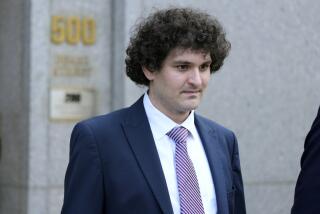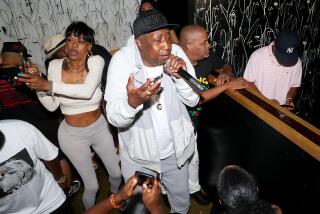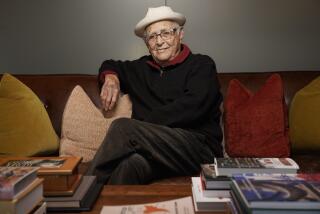Stanley A. Dashew dies at 96; helped revolutionize credit card industry
Stanley A. Dashew, an inventor and entrepreneur who helped revolutionize the credit card industry, died of natural causes Thursday in Los Angeles, according to a family spokesman. He was 96.
Dashew held 40 patents in fields as diverse as credit card processing, mining, mass transit, medical equipment and offshore oil transportation. He also was an avid sailor, writer and photographer who late in life wrote for the Christian Science Monitor and the Huffington Post.
At 94, he distilled his insights about life and business in a book, “You Can Do It: Inspiration and Lessons from an Inventor, Entrepreneur, and Sailor.”
“Life is not about whether you fail,” Dashew told the Los Angeles Business Journal in a 2011 interview. “It is about whether you pick yourself up after a failure and proceed forward anyway. Anything is possible with the right attitude and a dose of hard work.”
A multimillionaire, Dashew and his late wife, Rita, had traveled the world and supported efforts to strengthen international ties and promote peace. They helped build the Rita and Stanley Dashew Center for International Students and Scholars at UCLA.
Born Sept. 16, 1916, in New York City’s Harlem, Dashew and his family moved from there to Rockland County, where his father practiced law. His mother taught English to immigrants and became a leader in programs and services for the elderly.
At age 15, Dashew started a business bottling and selling root beer. While still in high school he was put in charge of a family summer resort, where he learned to operate and repair machines. He entered the job market at the height of the Great Depression.
By the age of 35, he had sold enough Addessograph label makers and other business machines to buy a 76-foot, two-masted schooner, the Constellation, which carried him and his young family on a 15,000-mile journey from Lake Michigan down the East Coast, across the West Indies and through the Panama Canal to Los Angeles. Newspaper accounts of the 18-month-long journey reported how his young son, Stephen, received his schooling in the open air as his baby sister, Leslie, amused herself in a playpen lashed to the deck.
In 1950, at the end of the voyage, the Dashews decided to stay in Los Angeles, where he launched Dashew Business Machines. The company helped to automate the credit card industry, which at the time relied on paper charge cards that would tear, fray and become difficult to read.
“Like the Dustin Hoffman character in the movie ‘The Graduate,’ it was revealed to me that the answer to all my problems — well, at least this one — was ‘plastic,’” Dashew wrote in the Huffington Post. “I had to find a way of creating a plastic credit card.”
Dashew learned that a former colleague had developed a plastic material that could be embossed. He and a team of engineers developed a machine with a keyboard that could emboss plastic cards with a customer’s name, account number and an expiration date. They also built an imprinting machine that could capture all the information contained on the card and print out a receipt to be signed by the customer. Bank of America, Chase Manhattan Bank and American Express would all use his technology.
Dashew’s work with Bank of America led to the creation of the BankAmericard, the first plastic bank card system. Diners Club and other bank and credit card programs followed. His work with Joseph P. Williams, a former Bank of America executive, led to the introduction of the Unicard — now known as Visa. In his pitch to American Express, Dashew embossed the names of each board member on a sample card, along with the date and the catchphrase he created, “Member since ...”
He sold Dashew Business Machines to a subsidiary of Howard Hughes’ Hughes Tool Co., in hopes of raising cash to expand operations. But Hughes executives took over and mismanaged the company, Dashew told The Times, and the company went bankrupt in 1965.
Over the course of his long business career, Dashew was involved in the development of Imodco, a single-point mooring system for giant oil tankers; the Omnithruster system used by commercial fishing and military vessels; and the Dashaveyor transportation system.
In his late 80s, while recovering from a broken hip, Dashew developed a mobility device called the Dashaway. It helped him stand up after hip surgery and cope with the physical limitations of Parkinson’s disease.
“I enjoy taking new risks, and launching into unknown territory,” Dashew told The Times.
Dashew is survived by his children, grandchildren and great-grandchildren.
Services will be private. A celebration of his life will be announced at a later date.
More to Read
Start your day right
Sign up for Essential California for the L.A. Times biggest news, features and recommendations in your inbox six days a week.
You may occasionally receive promotional content from the Los Angeles Times.






